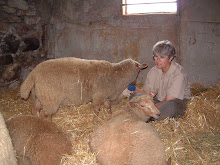A number of years ago I was at a Crop Seminar on alternate methods for weed control. I went there thinking that I would find some alternate pest management strategies such as rotation, permaculture, green manures etc. Instead I listened to a lecture on tank mixes of various herbicides.
Our use and in some cases overuse and abuse of chemical herbicides has resulted in a vast number of weed species that are resistant to these chemicals. The response has been to bring out stronger and new chemicals and now tank mixes of a mixture of chemicals to combat weedy species.
We have a number of invasive weeds here on the farm that are resitant to any number of chemical herbicides and we don't even try to go after them with these methods. Now we are mowing before they go to seed, using competitive exclusion etc. Since we have seldom used herbicides on this farm it is unlikely that we created the resistance on site. The resistant species have invaded on the wind or tagging along with wildlife or tires.
So what does this have to do with worms, that is internal parasites of our sheep and horses? Like with weeds, over this summer we have found that the internal parasites in our sheep are resistant to two of the main products used to eliminate these parasites ie Valbazen and Ivomec. The choices for alternate products here in Canada are very limited. And are we alone? No, a recent U. of Guelph study showed that about 80% of the farms they tested had some level of resistance to these products.
Are we at fault for the resistance problem on our farm? Probably but no more so than any other shepherd trying to reduce the parasite burden within their flock. Some resistance we probably imported from farms where we sourced animals and some was probably developed on this farm with our deworming practices.
With all our technology we just can't beat good old fashioned natural selection. By using a drug that is lethal to the organism being controlled we have very strong selective pressure to organisms that are resistant to that drug. With random mutations occuring in an organism all the time, some of these mutations will by chance confir resistance to the drug. Put very strong selective pressure on that population of organisms and only the resistant organisms survive.
The purists say that there are natural dewormers. Maybe they work if the burden is low or work to prevent acquiring the organisms in the first place but as treatment for a serious burden in reality most do not work. Been there, tried that, tested that. Apple cider vinegar - doesn't work. Diatomaceous earth - doesn't work. Garlic- doesn't work. Pumpkin seeds - doesn't work. Willow leaves and black walnut leaves - might work to an extent. Bird's foot trefoil in pasture - might work. Elevated bypass protein- probably helps. Rapid pasture rotation and long pasture rests between grazing- probably works. So the solution is not so much drugs but fencing and seeding.
Our ewe flock that is rotated through pastures with high concentrations of bird's foot trefoil, crown vetch and some willow are almost completely clear of parasites.
We have also been monitoring ewe and ram families and are selecting for resistant lines. These unfortunately are not necessarily our most productive lines. However heavy parasite burden reduces production so it is a trade off.
Are we out of the dark regarding parasite control? No but we are working on strategies and testing those strategies. I do not think that it is a goal to be totally rid of parasites but to be able to co-exist with them without having an effect on production.
TTFN,
Laurie
Tuesday, October 2, 2012
Subscribe to:
Comments (Atom)

